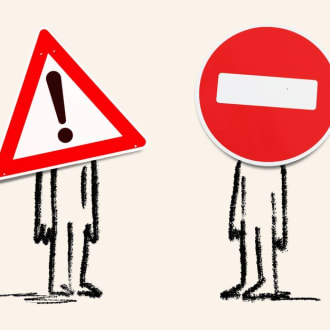The Best of The Atlantic
20+ most popular The Atlantic articles, as voted by our community.
Trending
These are currently making the rounds on Refind.
The Terrible Costs of a Phone-Based Childhood
For a little over a decade, we have been raising children in an environment that is hostile to human development. We need to change that now.
What Do Crossword Puzzles Really Test?
The puzzle is a site of play, a cultural forum, and even a political entity.
The End of Foreign-Language Education
Thanks to AI, people may no longer feel the need to learn a second language.
I Am in Cloud-Storage Hell
Services such as iCloud and Google Photos are holding my memories hostage.
The Lifeblood of the AI Boom
Applications such as ChatGPT and DALL-E have captured the world’s imagination—but AI companies are focused on something else.
The Atlantic on Elon Musk
Elon Musk Is Bad at This
The Musk era of Twitter has so far been defined by unhinged tweets, fleeing advertisers, and botched layoffs.
Elon Musk and Tucker Carlson Don’t Understand the First Amendment
Twitter is a private company, not the federal government—something Elon Musk and Tucker Carlson fail to understand, @DavidAFrench writes:
The Atlantic on Friendship
The Atlantic on Happiness
If You Want Success, Pursue Happiness
Many people chase achievement, assuming it will lead to well-being. They should reverse that order of operations.
«The first thing to remember is that happiness requires balance. No matter how much you enjoy your work, overwork will become an obstruction to well-being.»
The Seven Habits That Lead to Happiness in Old Age
Your well-being is like a retirement account: The sooner you invest, the greater your returns will be.
«“How to Build a Life” is a weekly column by Arthur Brooks, tackling questions of meaning and happiness.»
The Atlantic on Marriage
The First Lesson of Marriage 101: There Are No Soul Mates
A course at Northwestern University teaches students about what makes a healthy relationship.
What You Lose When You Gain a Spouse
What if marriage is not the social good that so many believe and want it to be?
The Atlantic on Parenting
Why Rich Kids Are So Good at the Marshmallow Test
Affluence—not willpower—seems to be what’s behind some kids' capacity to delay gratification.
The Atlantic on Politics
Reading Too Much Political News Is Bad for Your Well-Being
Obsessing over politics could hurt your happiness and your relationships.
QAnon Is Destroying the GOP From Within
Until last week, too many in the Republican Party thought they could preach the Constitution and wink at QAnon. They can’t.
The Atlantic on Relationships
The Six Forces That Fuel Friendship
I’ve spent more than three years interviewing friends for “The Friendship Files.” Here’s what I’ve learned.
«I’ve come to believe that friendship doesn’t always have to be about presence; it can also be about love that can weather absence.»
What the Longest Study on Human Happiness Found Is the Key to a Good Life
The Harvard Study of Adult Development has established a strong correlation between deep relationships and well-being. The question is, how does a person nurture those deep relationships?
«Loneliness has a physical effect on the body. It can render people more sensitive to pain, suppress their immune system, diminish brain function, and disrupt sleep»
The Atlantic on Russia
Russia’s Economic Blackout Will Change the World
Like all novel experiments, the group punishment of Russia is a leap into the unknown.
The Atlantic on Society
We Are Living in a Failed State
The coronavirus didn’t break America. It revealed what was already broken.
Why You Never See Your Friends Anymore
Our unpredictable and overburdened schedules are taking a dire toll on American society.
The Atlantic on Trump
How to Build an Autocracy
The preconditions are present in the U.S. today. Here’s the playbook Donald Trump could use to set the country down a path toward illiberalism.
The First White President
The foundation of Donald Trump’s presidency is the negation of Barack Obama’s legacy.
Popular
These are some all-time favorites with Refind users.
The Most Misunderstood Concept in Psychology
What are boundaries?
«Boundaries are often thought of as rules for other people, but in reality, they’re rules for ourselves.»
Have Smartphones Destroyed a Generation?
More comfortable online than out partying, post-Millennials are safer, physically, than adolescents have ever been. But they’re on the brink of a mental-health crisis.
«The aim of generational study, however, is not to succumb to nostalgia for the way things used to be; it’s to understand how they are now.»
Your Career Is Just One-Eighth of Your Life
Five pieces of career advice, shaped by economics, psychology, and a little bit of existential math
«By the way, beware this inverse relationship, as sometimes the most attractive titles are reserved for the most soul-destroying labor.»
What is Refind?
Every day Refind picks the most relevant links from around the web for you. is one of more than 10k sources we monitor.
How does Refind curate?
It’s a mix of human and algorithmic curation, following a number of steps:
- We monitor 10k+ sources and 1k+ thought leaders on hundreds of topics—publications, blogs, news sites, newsletters, Substack, Medium, Twitter, etc.
- In addition, our users save links from around the web using our Save buttons and our extensions.
- Our algorithm processes 100k+ new links every day and uses external signals to find the most relevant ones, focusing on timeless pieces.
- Our community of active users gets the most relevant links every day, tailored to their interests. They provide feedback via implicit and explicit signals: open, read, listen, share, mark as read, read later, «More/less like this», etc.
- Our algorithm uses these internal signals to refine the selection.
- In addition, we have expert curators who manually curate niche topics.
The result: lists of the best and most useful articles on hundreds of topics.
How does Refind detect «timeless» pieces?
We focus on pieces with long shelf-lives—not news. We determine «timelessness» via a number of metrics, for example, the consumption pattern of links over time.
How many sources does Refind monitor?
We monitor 10k+ content sources on hundreds of topics—publications, blogs, news sites, newsletters, Substack, Medium, Twitter, etc.
Can I submit a link?
Indirectly, by using Refind and saving links from outside (e.g., via our extensions).
How can I report a problem?
When you’re logged-in, you can flag any link via the «More» (...) menu. You can also report problems via email to hello@refind.com
Who uses Refind?
450k+ smart people start their day with Refind. To learn something new. To get inspired. To move forward. Our apps have a 4.9/5 rating.
Is Refind free?
Yes, it’s free!
How can I sign up?
Head over to our homepage and sign up by email or with your Twitter or Google account.




























